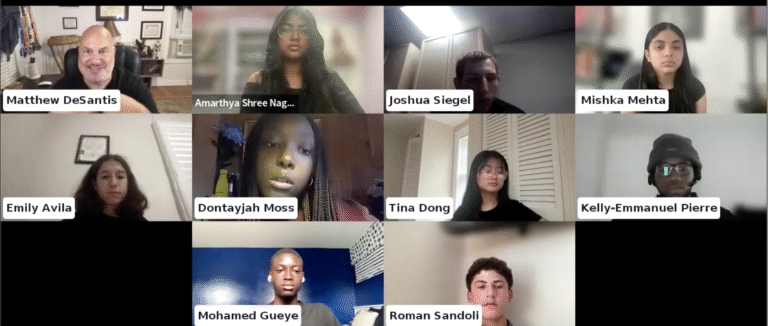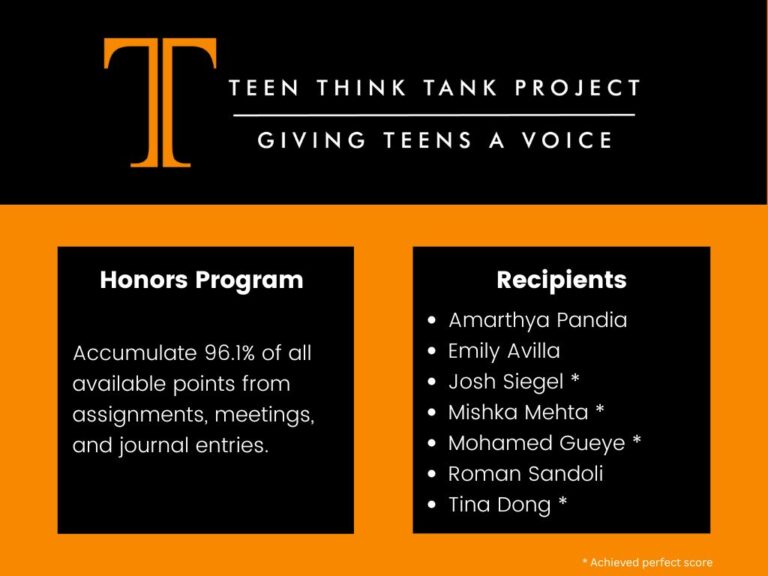Mental Healthcare
“We don’t have a mental health care system in this country; we have a mental illness crisis management system.”
Dr. Kenneth Paul Rosenberg, Author
Our Mission
Ten exceptional teens undertook an in-depth investigation into the economic, social, and legal forces driving the nation’s mental health crisis. They uncovered how stigma, misguided policies, and shortcomings in the health care system continue to deny millions of Americans the support they need. By providing these emerging leaders with the tools, knowledge, and confidence to challenge these barriers, we are empowering them to help shape a more equitable and effective mental health care system for the future.
Our Work
On July 31, 2025, the Teen Think Tank Academy’s Mental Health Equity Research Cohort unveiled its policy framework during a live webinar. We are grateful to everyone who joined the broadcast and to all who continue to champion our mission to advance mental health equity for every American.
Our Framework
Confronting Economic, Social, and Legal Obstacles to Mental Health Equity in America
Mental health equity is not simply a matter of increasing the number of therapists or clinics. It is a complex challenge shaped by the ways our economic systems, social structures, and legal frameworks interact to either support or restrict access to care. For many Americans, these forces create barriers that make mental health treatment difficult to obtain, uneven in quality, or entirely out of reach.
As part of the Teen Think Tank Project, the Mental Health Equity Research Cohort set out to explore these barriers in depth. Our approach was to look at the problem from three critical angles: economic, social, and legal impediments. Economic factors often dictate whether a person can afford treatment, whether through insurance limitations, out-of-pocket costs, or the uneven distribution of mental health resources. Social factors—such as stigma, discrimination, and the way communities talk (or do not talk) about mental health—can determine whether individuals seek help in the first place. Legal issues, from gaps in mental health parity enforcement to policies that unintentionally exclude vulnerable populations, add another layer of restriction.
Economic Impediments
Access to mental health care in the United States is often determined less by the severity of a person’s condition than by their ability to pay for treatment. While one in five Americans experiences some form of mental illness each year, only about half receive care, and the reasons are deeply rooted in economics, not in a lack of awareness or concern. Mental health treatment is rarely a one-time cost; it is often a lifelong process involving medication, therapy, and ongoing monitoring. For many, this translates into a permanent and usually unaffordable financial burden.
The structure of the U.S. healthcare system compounds these challenges. As mental health care has become entangled in a profit-driven insurance model, coverage gaps, high deductibles, and restrictive provider networks prevent millions from accessing necessary services. Even for those with insurance, limitations such as prior authorization requirements, “fail-first” therapy mandates, and lower reimbursement rates for mental health providers reduce the availability and quality of care.
These economic barriers are reinforced by the high cost of developing new treatments. The pharmaceutical industry, while enormously profitable, invests relatively little in mental health research compared to other medical fields. Innovation has stagnated, with many current psychiatric medications functioning much as they did decades ago. The reluctance to invest in more effective treatments reflects a broader pattern in which financial considerations outweigh patient need.
Understanding these economic realities is critical to building a more equitable mental health system. Without addressing the profit incentives that drive insurance and pharmaceutical practices, millions will continue to be priced out of the care they need, deepening disparities and worsening public health outcomes.
Social Impediments
Social conditions have a significant influence on whether people seek mental health care and how that care is provided. Factors such as community attitudes, the quality of local resources, and the history of interactions between certain groups and the health care system can determine access just as much as the availability of clinics or insurance. For many racial and ethnic minorities, immigrant communities, and families with limited income, obstacles include distrust rooted in past medical abuses, negative stereotypes about mental illness, and a shortage of providers who understand their cultural background. Schools, neighborhoods, and language access also shape opportunities for treatment, with inequities in education and public services often exacerbating these challenges. This section examines how social issues limit access to care and explores strategies to build trust, reduce stigma, and develop services tailored to the needs of diverse communities.
Legal & Political Impediments
Laws and regulations have a direct impact on who can get mental health treatment and what kind of help they receive. While measures such as the Mental Health Parity and Addiction Equity Act were designed to make coverage fairer, many rules are poorly enforced or vary so much by state that their protections are uneven. Legal gaps still affect how insurance companies handle mental health claims, how crises are managed, and how disability protections are applied.
In some situations, outdated policies or inconsistent application of the law leave people without the support they need. This section reviews the current legal landscape, explains where it fails to meet the needs of those with mental health conditions, and discusses reforms that could make access to care fairer and consistent.
Policy Recommendation
Economic, social, and legal issues all combine to make it much harder for people in the U.S. to get the mental health care they need. Each of these problems feeds into the others, creating barriers that can seem impossible to overcome. The only way to make real progress is to work on all of them at once—lowering costs, ending stigma, making services culturally respectful, and enforcing laws that protect access to care. If these changes are made, the mental health system could move closer to treating people with the fairness, understanding, and urgency they deserve.
Read the complete policy framework on Medium.com or download it here.
Our Story
Each summer, the Teen Think Tank Project brings together high-potential teens from across the country to explore, research, and design policy solutions for some of America’s most urgent social justice challenges. This is the story of ten teen change agents who spent three weeks confronting the economic, social, and political barriers to mental health equity—and working to create a system where quality mental health care is accessible to all individuals.
Our Team

Connect with us on LinkedIn!
- Emily Avila – Linden High School/Kean Scholar Academy
- Mohamed Gueye – Linden High School/Kean Scholar Academy
- Tina Dong – North Plainfield High School
- Mawada Hamdy – El_Dawaa Islamic for Girls School
- Mishka Mehta – West Windsor Plainsboro High School North
- Dontayjah Moss – Marion P Thomas Charter/Kean Scholar Academy
- Amarthya Nagendrapandian – West Windsor Plainsboro High School South
- Kelly-Emmanuel Pierre – Charlotte Catholic High School
- Roman Sandoli – Yorktown High School
- Joshua Siegel – Linden High School/Kean Scholar Academy










Our Motivation
Academic Honor Roll
At the Teen Think Tank Project (TTTP), our mission is to cultivate qualities like intellectual humility and a growth mindset—skills we see as essential for personal and societal progress. While we focus on fostering these intrinsic strengths, we also value the importance of celebrating academic excellence. Each cohort, we honor research associates who complete at least 96.1% of their tasks, assignments, and meetings with academic awards. This approach balances personal growth with recognition of achievement, reflecting our commitment to developing well-rounded, high-impact leaders.

Congratulations to all of our research associates who excelled in our program and been given the distinction of graduation “with honors.”
Our Scholarship
Each session, the Teen Think Tank Project awards a cash scholarship to the research associate who best embodies our community’s values. With so many talented cohort members eligible, selecting a recipient is never easy—and this session was no exception. We applaud all who applied and proudly recognize our finalists, Amarthya Nagendrapandian, Emily Avila, and Mishka Mehta, for their exceptional contributions.
Congratulations to Amarthya for being named the cohort’s Most Outstanding Research Associate and receiving a $500 scholarship.


